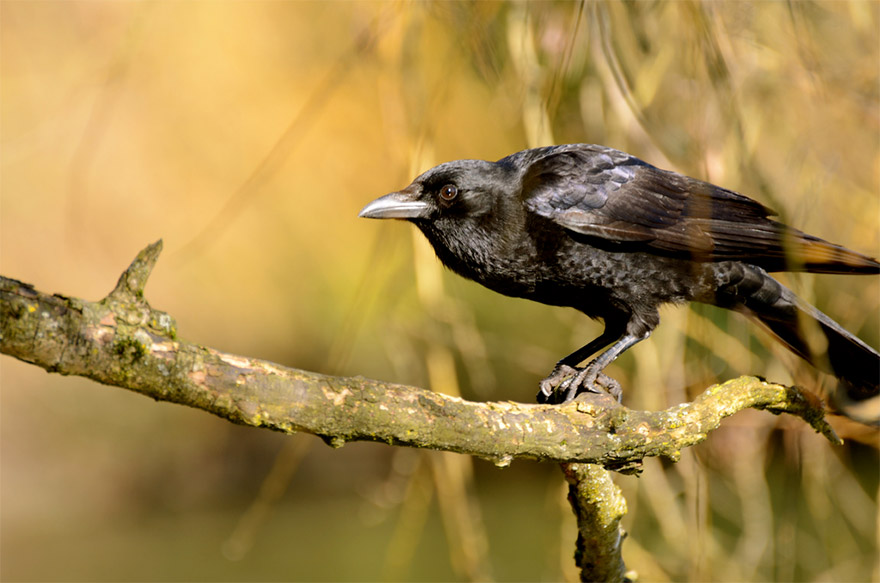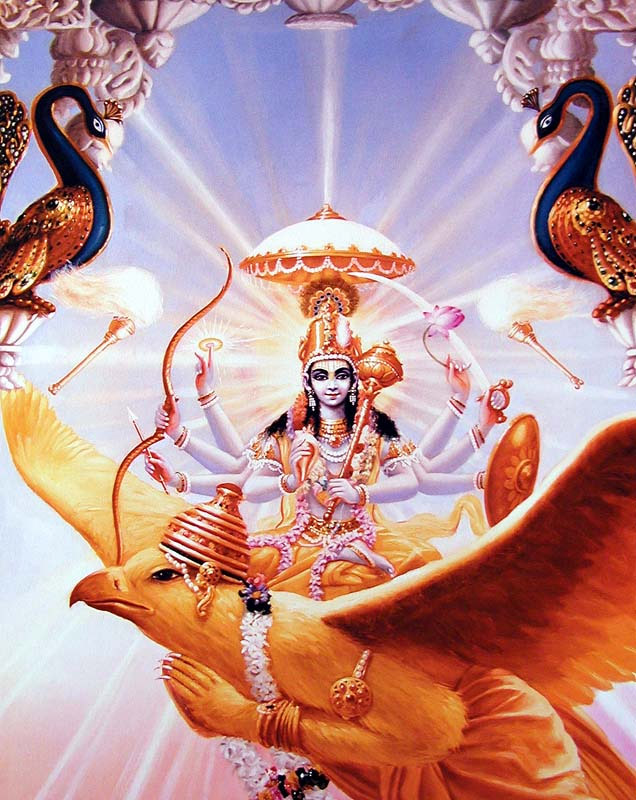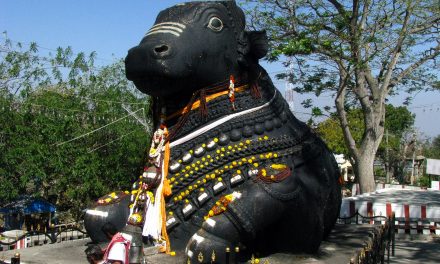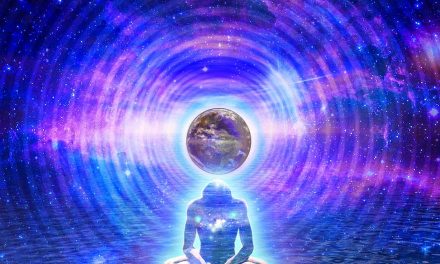In Uttarkanda, the last chapter of Ramacharitamanas, we find the teachings on bhakti yoga delivered by Kaka Bhusundi, who was an enlightened sage in the body of a crow, to Garuda, the celestial eagle and vehicle of Lord Vishnu. Kaka Bhusundi is a great bhakta of Sri Rama and teaches all the feathered folk who flock around him about the path of devotion to Sri Rama. Kaka Bhusundi first relates the story of Sri Rama’s life, but it is more than just a story. What he is really conveying is the path of bhakti yoga.
Devotion to God is something we can never understand unless God comes himself in the form of a man. We can conceptualize about some abstract philosophical ideal, but that is not God. As human beings, we can only experience and relate to that God who comes to us in the same form as we are. We can understand our life and the people around us, but we cannot understand something very abstract which we have never experienced or known.
[wp_ad_camp_1]
Therefore, the story of Sri Rama is the story of God who was born in the form of a man. This initiates the path of bhakti yoga and brings it into existence for us, because bhakti yoga is the love of God embodied, God born as a man, God made manifest, not the unmanifest God but the God that we can see, touch and relate to. This is the teaching given to Garuda when Kaka Bhusundi told the story of Sri Rama’s life. In this sense, it was more than a story; it was a form of darshan, a vision of God as a man.
After hearing the story of Sri Rama’s life, Garuda’s doubts were resolved and he asked Bhusundi, “But how did such a knowledgeable person as you come to inhabit the body of a crow?” Bhusundi replied, “I was not always in this form, as you see me now. Listen now to the story of how a vainglorious young man gradually becomes transformed into a devotee and then into a pure soul, who is completely merged in God.” So, Bhusundi tells Garuda the story of his own life, and this forms the second part of his teaching, which is a great inspiration, especially for those of us who seek the heights of spiritual life without understanding what this may entail.
Early Life of Kaka Bhusundi
Kaka Bhusundi was not always a crow. Originally he was born in Ayodhya, and as a young man he was very arrogant and proud. In his youth he became a devotee of Lord Shiva and every day he would go to the temple to pray. During this time he met a saint, who was a Brahmana and also a devotee of Lord Shiva, but at the same time full of respect for Sri Rama too. Even though Bhusundi was a young and arrogant fellow, the saint was very kind to him, giving him many teachings and also initiating him into Shiva’s mantra.
Although Bhusundi grew up in Ayodhya, he had a very strong aversion to Sri Rama. Whenever he saw servants or devotees of Sri Rama, he would get very angry and speak rudely to them and about them. The kind saint, who was trying to help and teach him, would daily reproach him for this and ask him not to behave in this way. “Look,” he would say, “the fruit of worshipping Shiva is only faith and devotion to Sri Rama. All the practices you do, all the efforts you make towards attaining the grace of Shiva, will only lead you to the feet of Sri Rama.” However, Bhusundi would become all the more angry and sometimes even shout at his saintly preceptor.
This went on for some time, but the preceptor never reacted. He continually tried to correct Bhusundi, who only wanted to worship Shiva, but in a very egotistical way. One day Bhusundi was doing japa in Lord Shiva’s temple, all the while thinking of himself as a very great meditator, as we sometimes think ourselves to be. He thought he understood the way better than his kind preceptor who had guided and initiated him. I will only follow Lord Shiva, he thought to himself, because Sri Rama is inferior, even repulsive. So, when his preceptor walked into the temple, Bhusundi went right on with his japa and meditation, ignoring him totally as if he wasn’t even there.
Remember that Bhusundi was praying to Lord Shiva, and the saint was also a devotee of Lord Shiva. So when Lord Shiva saw Bhusundi’s behaviour, he spoke aloud in the temple, “You stupid fool! I’ve had enough of your arrogance. Now I’m going to curse you roundly, and you’ll not escape from this curse!” When the preceptor heard that, he became very worried, and young Bhusundi also started to tremble in his seat. Lord Shiva continued: “As you were too lazy and dull-witted to stand up and offer your preceptor due respect when he entered, I’m going to turn you into a serpent. You will henceforth become a python and dwell in the hollow of a tree!” When Lord Shiva spoke thus, the preceptor was overcome with fear and compassion for his errant and ignorant disciple. So he prayed to Lord Shiva, singing a beautiful hymn (Namami shamishana nirvanaroopam, which is in Uttarkanda 107) on behalf of Bhusundi, to mitigate the curse.
Lord Shiva was pleased, because the Lord is always pleased when his devotee is sincere, kind and forgiving. So he said to the preceptor, “Alright, I will grant you any boon.” The preceptor replied, “Well, first give me the boon of always being devoted to your feet. But second, kindly give me another boon!” Shiva agreed, and then the preceptor said, “Forgive Bhusundi, the poor ignorant fellow is just lost in illusion and doesn’t know any better.”
Lord Shiva replied, “My words can never be in vain, but I will try to help him. Even though this curse must come true, it will eventually become a source of blessing for him. He will have to take one thousand sub-human births and live in all the different lower forms, but I will spare his suffering in each birth. He will neither suffer the agony of birth and death nor will he lose the awareness of all his past births. And gradually, because he was born in Ayodhya, and because he worshipped me, he will achieve devotion for Sri Rama.”
Rebirth of Kaka Bhusundi
So it happened that immediately upon leaving the temple, Bhusundi went into the forest, where he dropped his body and started the process of transmigration. He was born as a serpent and then took birth in a thousand other sub-human forms. Each form he assumed dropped away with ease, just as a man casts off old clothes and dons new ones, and his understanding never left him. Finally, at the end of all these transmigrations, he had acquired a deep love for Sri Rama and was born as a Brahmana.
While growing up, Bhusundi was only interested in hearing Sri Lord Rama and enacting his lilas. Sometimes his father would try to educate him, but he was never interested in secular things. He only wanted to know about Sri Rama. Upon reaching maturity, he went to live in the forest. There he moved continually from hermitage to hermitage, asking the different saints, rishis and hermits to tell him about the life of Sri Rama and about his divine qualities. He would listen to these stories and feel happy, and then he would move on again to another hermitage.
All the worldly desires had left him and only one longing grew within his heart – to behold the lotus feet of Sri Rama. The view of an impersonal God, which many of the sages held, did not appeal to him at all, but love for the embodied Lord filled his heart more and more. So he went about the forest singing the praises of Sri Rama with a love which became stronger every moment. Finally he came to the sage Lomasa, who was renowned for his great learning, and asked for guidance on how the embodied Lord should be worshipped.
The great sage recounted a few of Sri Rama’s virtues, and then launched into a long discourse about the glories of the unmanifest supreme spirit, thinking Bhusundi fit to receive such knowledge. But the truth that the individual soul is identical with the formless and attribute-less universal Brahman did not appeal to Bhusundi’s heart. Bowing to the sage, he again asked, “Kindly tell me how to worship the embodied Lord. My mind takes delight in Sri Rama, just as a fish loves to be in water and cannot live outside it. Therefore, O great sage, teach me the method whereby I may be able to see the Lord of Raghus with my own eyes. After seeing the Lord, I will then listen to your discourse on the attribute-less Brahman.”
The sage once again recited the story of Sri Rama, but demolished the doctrine that the Supreme appears in an embodied form, and re-established the proposition that the Supreme is ever without attributes. Bhusundi then reiterated his view with great obstinacy, and so the two entered into a heated discussion. The impassioned sage expounded on the formless God again and again, while Bhusundi responded with questions which advanced his own argument, without listening respectfully to the wisdom of the great sage.
Finally, the sage became infuriated with Bhusundi and spoke the following words, “You refuse to accept the wisdom I am teaching you, and indulge in endless arguments and counter-arguments. You are extremely self-opinionated and, like a crow, look upon everything with distrust. Therefore, you shall at once take the form of a crow.” Bhusundi bowed to the curse pronounced by the sage without any feeling of fear or animosity, and was immediately transformed into a crow. Taking leave of the sage and fixing his thoughts on Sri Rama, Bhusundi joyfully took flight.
When the Lord came to know that his devotee Bhusundi had just received another curse, he confronted the sage and asked him to rectify this mistake. Lomasa was amazed at the extraordinary forbearance and faith shown by Bhusundi and politely called him back, repenting again and again for his harsh action. The sage consoled Bhusundi in every way and then imparted to him the mantra of Sri Rama and the method of meditation on Sri Rama as a child, which pleased him very much. He also recited the entire Ramacharitamanas to Bhusundi and gave him the blessing that devotion to Sri Rama would ever abide in his heart without interruption. At that moment a celestial voice was heard from the heavens, “May your blessing come true, O enlightened sage, for he is my true devotee in thought, word and deed.”
Bhusundi was overjoyed to hear the Lord’s benediction and all his doubts immediately vanished. Asking the sage for permission to depart, Bhusundi went away to his own hermitage, where he continued to live in the form of a crow for twenty-seven cycles of creation. There he remains ever engaged in singing the praises of Sri Rama while the enlightened birds gather around him to listen. Each time the Lord assumes the form of a man in the city of Ayodhya, for the sake of his devotees, Bhusundi goes there to enjoy the spectacle of his childish sports. Again enshrining the image of the child Rama in his heart, he returns to his hermitage.
This was the story Bhusundi imparted to Garuda, the king of birds, when asked how such an enlightened soul came to inhabit the body of a crow. When Garuda asked again why he continued to live in such a lowly form when he could easily take any other, Bhusundi replied, “I love this body only because it was in this form that uninterrupted devotion to Sri Rama sprang up in my heart. I was blessed by the Lord in this body and all my doubts vanished.” Bhusundi upheld the path of devotion for which the great sage cursed him to take the form of a crow. But eventually he obtained the boon which he sought, and which is difficult even for sages to obtain. This is the power of bhakti.
















Kaka Bhusundi is known by the name “Sri Kagabujandar” in Tamil. He has left behind him a vast treasure of palm-leaves astrological manuscripts forecasting the future of millions of people born on this earth. He was one of the 18 Siddhars (sacred saints) who lived in Tamilnadu and attained Samadhi at Uraiyur, Trichy in Tamilnadu. There are a few shrines in Tamilnadu for him. Please refer to “https://en.wikipedia.org/wiki/Kagapujandar”.
Kaka Bhusandi is related to Sri Khetra Puri Dham. We deeply worship Rohini Kunda adjacent to Kalpa Vrikshya inside Jagannath Temple standing thousand years old Banyan Tree. Bhusandi Kaka fell down in Rohini Kunda and got immediate salvation with Chatrubhuja and Mokshya. We call Kaka Chaturbhuja, where Kaka fell and went to Baikuntha Dham. It is related with reference to Skanda Purana, Utkal Khanda. Varsana Bharata Srestha, Desanam Utkala sruta, Utkalasya Desasamo nasti Desha Mahitale.